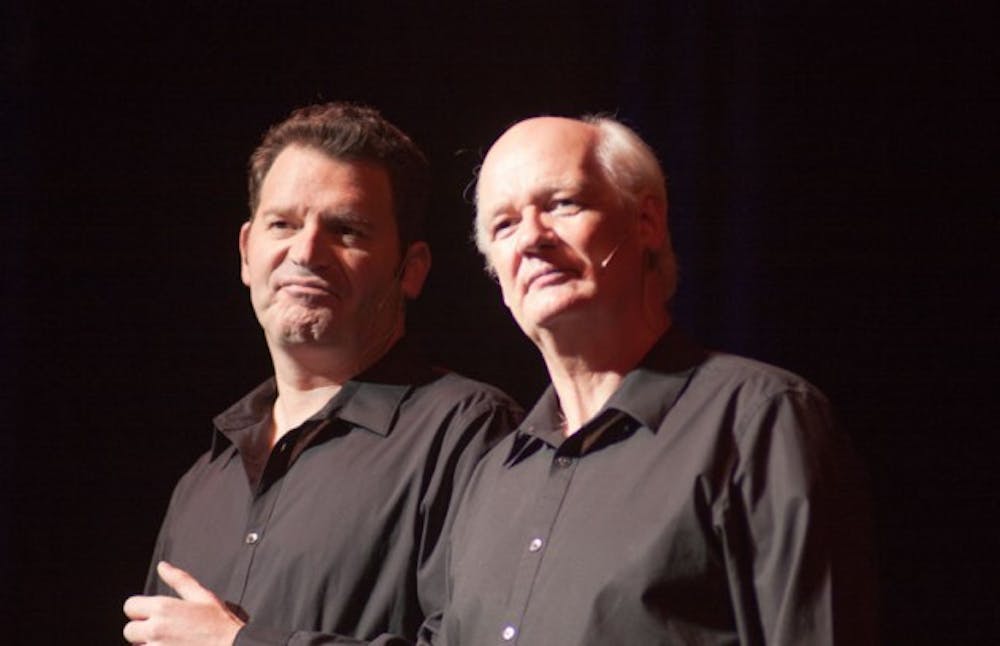Comedians Colin Mochrie and Brad Sherwood tiptoed blindly through a minefield of 100 mousetraps – trying to avoid the traps – and one another – during the comedic, self-mutilating battle.
What started as a comedy skit quickly turned into mischief, as the comedians broke the rules of their own game, sneakily slipping off their blindfolds and hurling the active traps at each other.
The “Whose Line Is It Anyway?” stars performed at UB’s Center for the Arts as a two-man improv group Friday night. Their performance was structured similarly to the televised show: A series of skits in which the comedians improvised song lyrics, sound effects and characters on the spot.
Mochrie and Sherwood have been performing together for more than 11 years and have created a two-man traveling improv show, predominately performing on weekends. The duo prefers playing performances live in a theater rather than doing prerecorded shows on a set. It gives them more freedom to fail, they said, which is a terrifying prospect that makes their performance even more satisfying when they succeed.
As comedians, Mochrie and Sherwood shy away from any type of structure or pre-planning – everything they do is improvised.
“We both do our best work when we’re in the unknown and a little scared,” Sherwood said. “That’s when our best stuff comes out. We open up some little scared part of our brain that really makes us rise up to the occasion.”
Sherwood says most stand-up comedians are terrified of improv and most improvisers are terrified of stand up. They said there isn’t anything appealing to them about stand-up comedy, which requires a lot of advanced planning, trial and error and rehearsal of a comedic monologue that can be repeated verbatim at multiple performances.
An improviser’s show is never the same twice, which prevents boredom elicited by continuously performing the same routine, the duo said. Each night is a unique experience for the comedians and the audience.
“The audience knows we have nothing; they’re giving us all the suggestions,” Mochrie said. “They want to see us in trouble, but they don’t want to see us fail.”
In this way, the audience is the backbone of the performance. Improv requires a relationship between the performer and the audience that goes beyond simple cause and effect – beyond the performer telling jokes and the audience applauding.
Members of the audience were called on stage to partake in games such as “Fill in the Blank” and “Sound Effects.” Participants were randomly selected and brought on stage where they were instructed on how they could be part of the performance. Their job in most cases was to help guide the performers in improvising a storyline.
Cory Reisman, who performs with UB’s improv club, was one of the audience members called on stage during the performance.
“It was actually a dream come true being able to go on stage with the guys who made me want to do improv,” Reisman said. “I’m still star struck.”
Reisman is the treasurer of UB Improv and plans to incorporate some of what he saw during the performance into the club’s skits.
Bringing audience members up on stage gives participants a more vested interest in the success of the performance, Mochrie said. But the relationship between the performers themselves is also vital to the success of the performance.
“I think the two of them compliment each other very well,” said Nick McCabe, 27, from Amherst. “It wouldn’t have the same effect if Colin was with Wayne instead, or Brad with Ryan,” he added, referring to other “Whose Line is it Anyway?” cast members Wayne Brady and Ryan Stiles.
Sherwood describes the performance as being similar to a magic act – everything is being made up and the comedy of the show is accompanied by an element of wonder.
During the duo’s “fill in the blank sketch,” which asks audience members to interject in an ongoing sketch, one student said the word “toilet.” The word prompted a Sherwood to go on a tangent about “space poo,” which had the audience in hysterics.
“Rule No. 1 of space travel, and sometimes No. 2: There is no No. 2,” Sherwood told the audience. “There is only No. 1. That is the No. 1 rule of space poo. Two must become one. One is the loneliest number you will ever poo in space.”
The same rules apply to space travel as they do to improv. Two people must become one.
Tori Roseman contributed reporting to this story.
email: arts@ubspectrum.com





